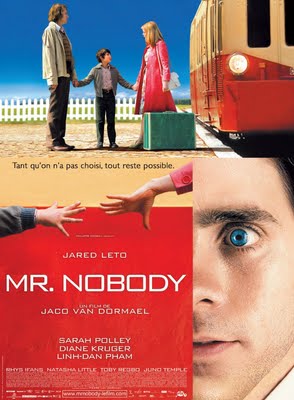
MR NOBODY
Belgium/Canada, 2009, 125 minutes, Colour.
Jared Lito, Diane Kruger, Sarah Polley, Linh Dan Pharm, Juno Temple, Rhys Ifans, Toby Regbo, Daniel Mays, Natasha Little, Alan Corduner.
Directed by Jaco van Dormael.
Mr Nobody is an intriguing film – but may be too baffling for average audiences. It is a futuristic fantasy.
Jared Leto, in an excellent performance, has to play the oldest man alive at the end of the 21st century. The film veers between that time and back to contemporary times. Leto has to perform as the young man and the old man. However, he is identified as Nobody – because in the future, humans have died out and only clones live. In his reminiscences, in his dreams, his goes into parallel worlds. We see his different upbringings, in different countries, from Wales to the United States. We see his different marriages, his different relationships. Diane Kruger is very good as his wife Anna. Sarah Polley is even better as his life-long love, a depressive woman called Elise.
The film is beautifully shot, has a varied musical soundtrack. For those who like mystery in their films and something exotic and esoteric, this film will fulfil all the expectations. Mr Nobody is an intriguing film – but may be too baffling for average audiences. It is a futuristic fantasy.
1.A fantasy, a fiction, futuristic? A portrait of humanity? The loss of humanity? Identity?
2.The title, Mr Everybody and Mr Nobody? The character’s name as Nemo?
3.The vision of the director, nothing real, everything possible, everything real? 2092, the post-human era, androids? Television and the watching of programs, the over-cheery hosts, themes of death, cameras? The audience in 2092 – and lost humanity?
4.The vision about the 20th and 21st century, ordinary life, families, growing up, parents, choices, possibilities, different paths and consequences? Chaos theory, the butterfly and its wing, the leaves floating – and their consequences? The director wanting the audience to imagine the differences had things been different? Alternate worlds?
5.Themes of absolutes, relativity, values?
6.The production design for the past, the present, the future: sets, décor, costumes? The visuals of the skyline of the futuristic city?
7.The musical score, its wide range, the popular songs, the classics, the lyrics and their relevance to the action?
8.Film references, 2001, The Fountain, Sliding Doors…? Alternate worlds?
9.The performances, Jarrod Lito as very old, as young, in the three marriages, his own family, the versatility? The performances of the wives, the parents, the children – especially as teens? The characters and their behaviour in their particular different worlds? Style, personalities, the colours of their costumes? Audiences being able to focus on the different perspectives of the characters?
10.The future, the doctor, the tattoos on his face, the interview, psychology, hypnosis, memories? Moving within memories? Nemo and his asserting that he was thirty-four – rather than as he appeared in his nineties?
11.The young journalist, curious about what it was to be human, human behaviour? Qualities and foibles? Relationships, love, sexuality – and Nemo’s explanation, down-to-earth? The journalist not understanding?
12.The proposal to show Nemo’s death on television, his saying it was the happiest day of his life, the meaning of death?
13.Nemo at thirty-four, 2009, stuck? Going back to 1975, his parents, his birth? As a young boy, with each of his parents? The directions of his life?
14.Chaos, the butterfly, the leaf, Nemo’s parents meeting, the fall, love, marriage, different personalities, their clashes, the mother and her relationship with Harry? Anna and the friendship with Nemo? Nemo seeing his mother? School life, the three girls who had become his wives? Hobbies, introspection?
15.The portrait of the parents, in love, parting? At the station? Nemo’s two choices, seeing each parent, with his father, following his mother? Staying with his father in England, the girls, Anna, Lisa and Jean? His long caring for his father? His injury, the coma, imagination?
16.Going with his mother, in the United States, with Harry and Anna? His life with his mother, her happiness and lack of happiness? His relationship with Anna, falling in love? The clash with Harry, Harry leaving? Harry and his condemnation of the relationship between Anna and Nemo?
17.The visualising of the three marriage ceremonies, Nemo as a character moving in and out of each, knowing and not knowing which life he was in?
18.The continuing motif of the science lecture, science, the philosophical issues and commentary – for a television audience?
19.The future, the trips to Mars, cryogenics, the experience of the future, the people being thawed, Anna and Nemo on the spaceship, the bond, the failure of the mission?
20.Jean, the marriage being observed, Nemo not loving her, the children, Jean’s continued puzzle?
21.Elise, teenage relationship, her love for Stefano? Nemo and Anna, the dance, his marrying Elise, her still pining for Stefano?
22.The three marriages and the way that they were visualised, Nemo’s different appearances, the colour schemes for the house, the clothes? The different comfort – the home with the pool? The ordinary home and his cleaning the car…?
23.Elise, sick, morose, the children? Nemo and cleaning the car? Her complaint, his burning the car? Her getting up for the birthday party, her exuberant and joyful dance?
24.Nemo with each of his parents, with each of his wives, the children? A different person and a range of possibilities?
25.Nemo dying – yet the rewinding of his life? The audience being caught up in this fantasy – understanding, probing, uncertain?